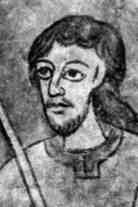Boleslaus I of Bohemia
| Boleslaus I, Duke of Bohemia | |
|---|---|

Boleslaus I the Cruel
|
|
| Reign | 935–967/972 |
| Spouse(s) | Biagota |
| Noble family | Přemyslids |
| Father | Vratislaus I of Bohemia |
| Mother | Drahomíra |
| Born | c. 915 |
| Died | 967 or 972 |
Boleslaus I the Cruel, also called Boleslav I (Czech: Boleslav I. Ukrutný) (c. 915 – 15 July, 967 or 972), was the ruler (kníže, "duke" or "prince") of the Duchy of Bohemia from 935 to his death. He was the son of Vratislaus I and the younger brother of his predecessor, Wenceslaus I.
Boleslaus is notorious for the murder of his brother Wenceslaus, through which he became Duke of Bohemia. According to tradition, Wenceslaus was murdered during a feast at precisely the time when a son of Boleslaus was born. The child was given a strange name: Strachkvas, which means "a dreadful feast". Remorseful for what he had done, Boleslaus promised to have his son educated as a clergyman and devoted his life to religion.
Despite his complicity in fratricide, Boleslaus is generally respected by Czech historians as an energetic ruler who significantly strengthened the Bohemian state and expanded its territory. His accomplishments include significant economic development due to an expansion in trade, the introduction of silver mining and the minting of the first local coinage, the Prague denarius.
There is evidence that Boleslaus's pagan mother influenced him against his brother and Christianity, though he later repented. In no way did he impede the growth of Christianity in Bohemia, and in fact, he actually sent his daughter Mlada, a nun, to Pope John XIII in Rome to ask permission to make Prague a bishopric.
One of Boleslaus's major concerns was the tribute paid yearly to the German (East Frankish) kings as stipulated in the peace treaty that Henry the Fowler had established with Boleslaus's brother Wenceslaus. He stopped the payment shortly after he ascended the throne, which led to a prolonged war with King Otto the Great. Boleslaus attacked an ally of the Saxons in northwest Bohemia in 936 and defeated two of Otto's armies (from Thuringia and Merseburg). The war then deteriorated to border raids (the general pattern of warfare in this region at the time) and reached its conclusion in 950, when Otto besieged a castle owned by Boleslaus's son. This prompted Boleslaus to sign a peace treaty with Otto. Although he remained undefeated, he promised to resume the payment of tribute. Five years later, the armies of Czechs and Germans allied against the Magyars in the victorious Battle of Lechfeld on 10 August 955. Boleslaus also helped Otto to crush an uprising of Slavs (Stojgněv and Nakon) on the Lower Elbe in Mecklenburg in 953.
...
Wikipedia
